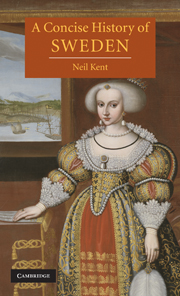Book contents
- Frontmatter
- Contents
- List of illustrations
- Maps
- Preface
- 1 From prehistory to Viking hegemony
- 2 The formation and growth of the Swedish state
- 3 The territorial consolidation of Sweden
- 4 Towards a centralist and military state
- 5 The collapse of absolutism and the Age of Freedom
- 6 Royal absolutism restored
- 7 Constitutional Sweden
- 8 The industrialisation and capitalisation of Sweden
- 9 The world wars and Swedish neutrality
- 10 Triumph of the Swedish welfare state
- Conclusion
- Appendix 1 Chronology
- Appendix 2 Monarchs and regents of Sweden
- Appendix 3 Prime ministers
- Selected further reading
- Index
6 - Royal absolutism restored
Published online by Cambridge University Press: 05 June 2014
- Frontmatter
- Contents
- List of illustrations
- Maps
- Preface
- 1 From prehistory to Viking hegemony
- 2 The formation and growth of the Swedish state
- 3 The territorial consolidation of Sweden
- 4 Towards a centralist and military state
- 5 The collapse of absolutism and the Age of Freedom
- 6 Royal absolutism restored
- 7 Constitutional Sweden
- 8 The industrialisation and capitalisation of Sweden
- 9 The world wars and Swedish neutrality
- 10 Triumph of the Swedish welfare state
- Conclusion
- Appendix 1 Chronology
- Appendix 2 Monarchs and regents of Sweden
- Appendix 3 Prime ministers
- Selected further reading
- Index
Summary
GUSTAF III’S NEW ORDER
In 1771, during the final year of his father King Fredrik Adolph’s reign, when Gustaf III was in Paris, carrying out important negotiations relating to Swedish–French relations, the political situation in Sweden had become increasingly chaotic. But Gustaf had already been laying his own plans to deal with this state of affairs upon his return, so he utilised his time at the court of King Louis XV associating with a wide range of French and foreign intellectuals there, who could bolster his intellectual pretensions to benevolent autocratic rule when the situation permitted. Their conversations, however, frequently left him disappointed. As he himself wrote to his mother, Queen Lovisa Ulrika, at home, ‘I have become acquainted with almost all the philosophers here: Marmontel, Grimm, Thomas, the Abbé Morellet and Helvétius. It is much more amusing to read them than to meet them.’ So, when the sudden death of his father made him king, he eagerly returned to Sweden, where he finally put into action the plan which had long preoccupied him. For he had single-mindedly determined to succeed where his parents had failed, in refashioning Sweden into an absolute monarchy. The coup d’état carried out on 19 August 1772 by the king and his supporters was bloodless, yet it proved successful in re-establishing royal absolutism after a lapse of more than half a century. Whereas, in 1720, the four estates of Sweden – the nobility, Church, burghers and peasants – had together taken over the role of the absolute monarch, Gustaf III now reclaimed that role from them. At the same time, he increasingly allied himself with the peasants, an arrangement which worked to the detriment of the interests of the nobility, in particular, since he made it possible for peasants with sufficient means to purchase at least some of the land that had previously been inalienable from the aristocracy.
- Type
- Chapter
- Information
- A Concise History of Sweden , pp. 129 - 148Publisher: Cambridge University PressPrint publication year: 2008



